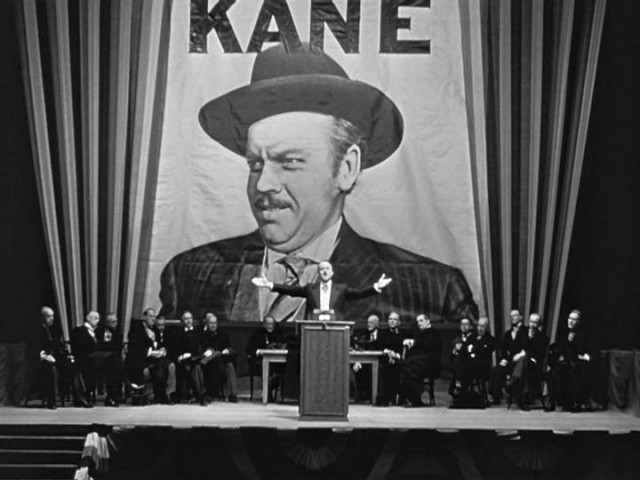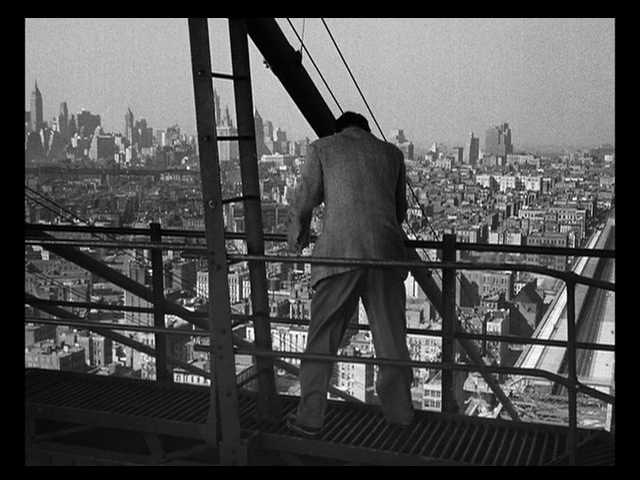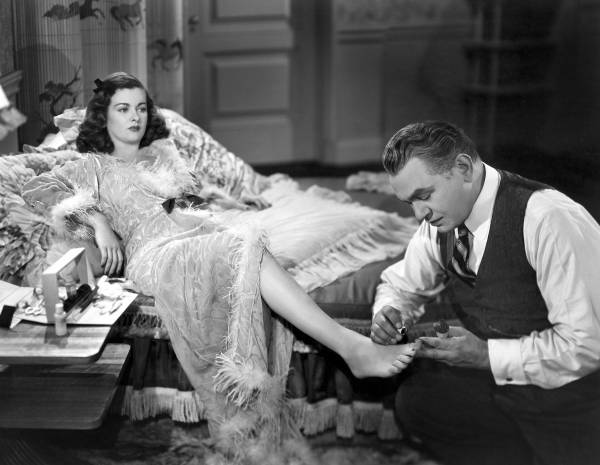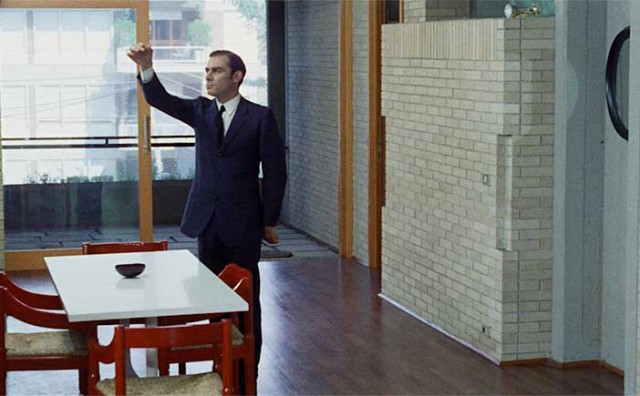
Gian Maria Volontè stars as a man seemingly above the law in Elio Petri’s 1970 Italian absurdist farce
INVESTIGATION OF A CITIZEN ABOVE SUSPICION (INDAGINE SU UN CITTADINO AL DI SOPRA DI OGNI SOSPETTO) (Elio Petri, 1970)
Film Forum
209 West Houston St.
September 28 – October 4
212-727-8110
www.filmforum.org
 As Investigation of a Citizen Above Suspicion begins, a man (Gian Maria Volontè) kills a woman (Florinda Bolkan) in the midst of some rather kinky sex. The man then goes out of his way to leave behind evidence tying him to the brutal crime, including making sure he is spotted as he exits the woman’s building complex. It is soon revealed that he is the former head of homicide in Rome who has just been promoted to chief of political intelligence, his victim a married lover of his who enjoyed acting out real murder cases with him. “How will you kill me this time?” she asks in a flashback, not knowing where their games will ultimately lead. For the rest of Elio Petri’s (A Quiet Place in the Country) absurdist farce, the man practically dares his colleagues to catch him as he continues to build a case against himself and rails against criminal and political terrorists and subversives in neo-fascist romps, filmed in daring close-up, that emphasize the importance of keeping the masses repressed. Shot in broad colors and featuring a playful score by Ennio Morricone, Investigation of a Citizen Above Suspicion is an enticing police procedural — in which the culprit is the man in charge of the case — as well as a satiric look at the state of Italian politics in 1970, as social unrest and sexual freedom grew throughout Europe and America. “Repressing all those evils is to cure them,” the man declares in a fiery speech to his department. Volontè (A Fistful of Dollars, For a Few Dollars More) clearly has a ball as a man who either wants to be caught or is out to prove that he is indeed above the law, Petri carefully keeping his motive ambiguous in this wonderful black comedy. Winner of the Oscar for Best Foreign Language Film and the Grand Prize at Cannes, Investigation of a Citizen Above Suspicion will be screening in a new DCP restoration at Film Forum September 28 through October 4, with Sony restoration expert Grover Crisp on hand to introduce the 7:30 screening on opening night.
As Investigation of a Citizen Above Suspicion begins, a man (Gian Maria Volontè) kills a woman (Florinda Bolkan) in the midst of some rather kinky sex. The man then goes out of his way to leave behind evidence tying him to the brutal crime, including making sure he is spotted as he exits the woman’s building complex. It is soon revealed that he is the former head of homicide in Rome who has just been promoted to chief of political intelligence, his victim a married lover of his who enjoyed acting out real murder cases with him. “How will you kill me this time?” she asks in a flashback, not knowing where their games will ultimately lead. For the rest of Elio Petri’s (A Quiet Place in the Country) absurdist farce, the man practically dares his colleagues to catch him as he continues to build a case against himself and rails against criminal and political terrorists and subversives in neo-fascist romps, filmed in daring close-up, that emphasize the importance of keeping the masses repressed. Shot in broad colors and featuring a playful score by Ennio Morricone, Investigation of a Citizen Above Suspicion is an enticing police procedural — in which the culprit is the man in charge of the case — as well as a satiric look at the state of Italian politics in 1970, as social unrest and sexual freedom grew throughout Europe and America. “Repressing all those evils is to cure them,” the man declares in a fiery speech to his department. Volontè (A Fistful of Dollars, For a Few Dollars More) clearly has a ball as a man who either wants to be caught or is out to prove that he is indeed above the law, Petri carefully keeping his motive ambiguous in this wonderful black comedy. Winner of the Oscar for Best Foreign Language Film and the Grand Prize at Cannes, Investigation of a Citizen Above Suspicion will be screening in a new DCP restoration at Film Forum September 28 through October 4, with Sony restoration expert Grover Crisp on hand to introduce the 7:30 screening on opening night.
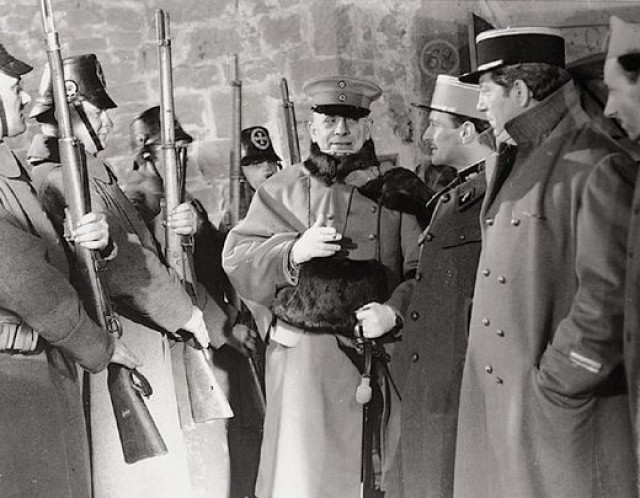
 If you’ve never seen this remarkable cinematic achievement, prepare to be overwhelmed by Jean Renoir’s antiwar masterpiece. The first foreign film to be nominated for a Best Picture Oscar, Grand Illusion is set in a POW camp during WWI, where everyman pilot Lieutenant Maréchal (Jean Gabin), by-the-book Captain de Boieldieu (Pierre Fresnay), lovable Rosenthal (Marcel Dalio), and others are being held by the aristocratic Captain von Rauffenstein (an unforgettable Erich von Stroheim). Proclaimed “cinematic public enemy no. 1” by Joseph Goebbels, Grand Illusion takes on anti-Semitism, class structure, and religion in addition to war, a humanist film that is as relevant as ever seventy-five years after its initial release. It will be screening on September 10 at Film Forum as part of “The French Old Wave” in a new 35mm restored print (shown earlier this year at Film Forum), made in honor of the film’s seventy-fifth anniversary. The series continues through September 13 with such classics as Jean Cocteau’s Beauty and the Beast and Renoir’s The Rules of the Game in addition to double features of Jean Grémillon’s Lumière d’Eté and Le Ciel Est à Vous, Henri-Georges Clouzot’s L’Assassin Habite au 21 and Quai des Orfèvres, and Grémillon’s Remorques and L’Étrange Monsieur Victor.
If you’ve never seen this remarkable cinematic achievement, prepare to be overwhelmed by Jean Renoir’s antiwar masterpiece. The first foreign film to be nominated for a Best Picture Oscar, Grand Illusion is set in a POW camp during WWI, where everyman pilot Lieutenant Maréchal (Jean Gabin), by-the-book Captain de Boieldieu (Pierre Fresnay), lovable Rosenthal (Marcel Dalio), and others are being held by the aristocratic Captain von Rauffenstein (an unforgettable Erich von Stroheim). Proclaimed “cinematic public enemy no. 1” by Joseph Goebbels, Grand Illusion takes on anti-Semitism, class structure, and religion in addition to war, a humanist film that is as relevant as ever seventy-five years after its initial release. It will be screening on September 10 at Film Forum as part of “The French Old Wave” in a new 35mm restored print (shown earlier this year at Film Forum), made in honor of the film’s seventy-fifth anniversary. The series continues through September 13 with such classics as Jean Cocteau’s Beauty and the Beast and Renoir’s The Rules of the Game in addition to double features of Jean Grémillon’s Lumière d’Eté and Le Ciel Est à Vous, Henri-Georges Clouzot’s L’Assassin Habite au 21 and Quai des Orfèvres, and Grémillon’s Remorques and L’Étrange Monsieur Victor.